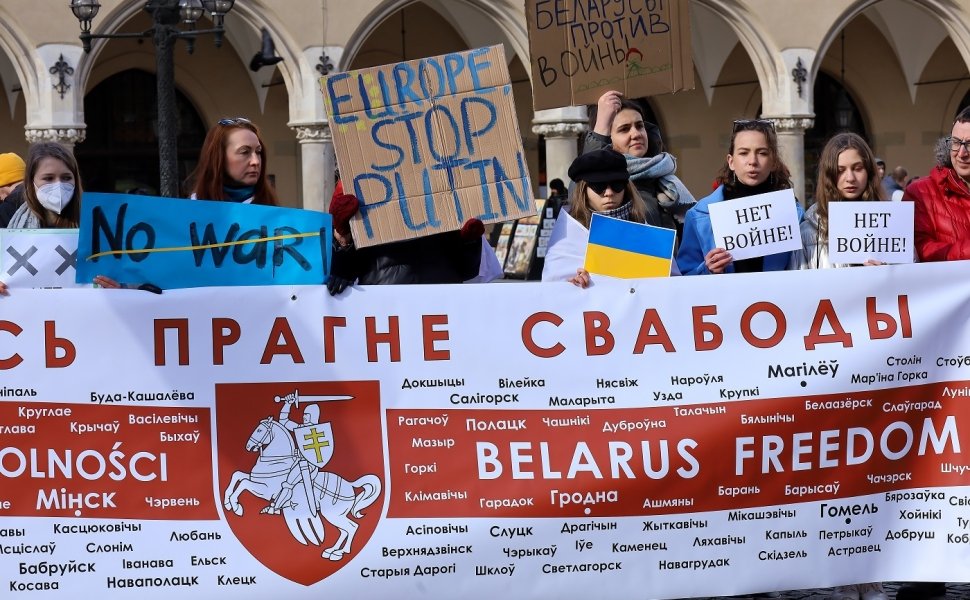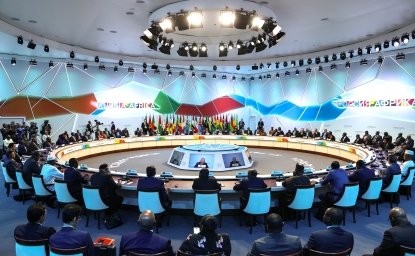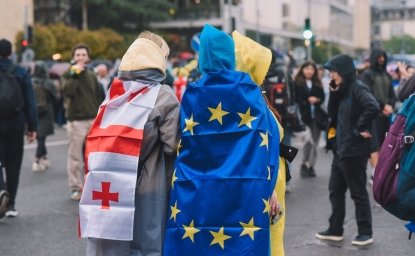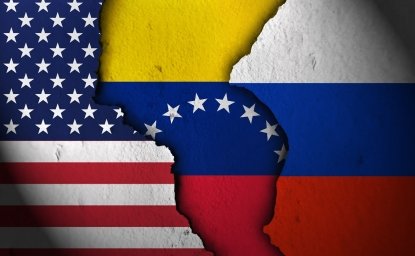The transcript has been lightly edited for clarity.
Nina Rozhanovskaya: From the Kennan Institute, this is Nina Rozhanovskaya, and you’re listening to The Russia File. It has been three years since the contested presidential election in Belarus and the mass pro-democracy protests. And despite calls for a peaceful transition of power, Aleksandr Lukashenko claimed victory in that election and his violent crackdown on the protests signaled a new era of political repression in the country and triggered a major emigration wave.
Today, we are going to discuss how the situation in Belarus has changed since 2020. And we’ll talk about the policies of the regime, the state of Belarusian society, as well as concerns, hopes, and expectations regarding the future of Belarus. And for that conversation, my guest is Artyom Shraibman. Artyom is a political analyst, the founder of Sense Analytics consultancy, a nonresident scholar at the Carnegie Russia Eurasia Center, and a contributor to Belarusian independent online publication Zerkalo.io. Artyom, welcome to the program.
Artyom Shraibman: Thanks for having me.
NR: And let me start by asking you about the overall state of affairs in Belarus. What is the situation in the country now, three years after those important political protests? How would you describe it in just a few words?
AS: Well, in a few words, it is a classic reaction phase of the authoritarian and increasingly totalitarian regime. So there are multiple features of the classic totalitarianism that we observe now in Belarusian domestic politics. The protests have been crushed, more than two and a half years ago. And since then, the only reliably stable trend is stepping up of repressions. Every month, every couple of months, we see new creative tactics to suppress not just protests—they are all gone—but even the free thinking, dissent. People who participated in the protests once, relatives of people who participated in protests or are opposition activists, people in exile, journalists…I can list the groups that are targeted for quite a long time.
NR: This sounds terrifying, but would then it be fair to say that currently there is no civil society left inside Belarus, that all of the independent media, all of the independent political forces and civil institutions are in exile?
AS: I would say that there are still some pockets of civil society in Belarus that were able to survive due to some accident because the authorities overlooked their existence and because they definitely don’t do anything remotely political or bordering on activism. Some charities have survived, some historic societies, some archeological societies—these sorts of groups have managed to survive. But we’re speaking about a tiny, tiny fraction of the civil society that existed before 2020, even in a very much authoritarian regime. There were hundreds of NGOs that since then have been all liquidated and most of them deemed extremist.
NR: And so here we come to this difference between authoritarian and totalitarian. And I noticed, even you used both words when describing the regime. So which one is it now? Are you hesitating to fully call it totalitarian because there is no mass mobilization of people? Does that mean that at this stage still Lukashenko only wants obedience, not people to rally for him? Is that the difference?
AS: Yes, this is one of them. Lack of public mobilization in support of the regime is something that differentiates classically totalitarianism from authoritarianism. But it’s not the only feature. There is also no coherent ideology. Possession of such ideology is a feature of a totalitarian state, and the Belarusian government has been struggling to come up with the ideology.
In many other realms, the regime has already plenty of the features of a totalitarian state. A cult of personality is being introduced and propagated in the country. The country is being militarized like any totalitarian regime, both in its propaganda, but also in the education system, where there are mandatory military classes now and military patriotic classes, as they describe it. They militarized previously civilian agencies. They appoint former security officers to run a lot of state companies, state organizations, even cultural institutions. So [there is] this pervasive militarization and securitization happening.
In other areas, there is also pervasive state control getting into various fields of public life. You have to pass through a special licensing process to become a tour guide or even a fitness instructor, and it includes you not having any past protest-related sins. And now the government is speaking about expansion of its infamous practice of forced allocation of graduates of universities to mandatory jobs. Now this Soviet practice exists only for people who had their student bills paid by the state. And so they have to work for two years at the job allocated by the state. Now the state is planning to make it total and make it universal. Every student will have to work for some time, an undefined number of years, for the job allocated by the state. This is also a feature of a totalitarian regime, where people are used as the economic resource, reallocated here and there, because the state needs it.
So it’s not just the sheer volume of repression that I’m talking about. Repression is just part of this totalitarian drift. But there are multiple other less obvious features of the state becoming more and more invasive. Also, obviously, all the usual suspected boxes get ticked. Like the anti-LGBT propaganda being stepped up. The government is now banning what they called the child-free propaganda also, because they need Belarusians to apparently give birth to more children. And now they want to introduce a special mandatory course in the schools on family values.
So you see this state trying to regulate everything. And this is not just suppression or persecution of people who protested in 2020. This is now way more. And obviously, the war in Ukraine aggravated the situation, because every pro-Ukrainian sentiment expressed publicly is now basically a crime.
NR: To follow up on that: back in 2020, when the protests were going on, they were widely covered by the media and seen as inspirational by many people across the globe. And since 2022, developments in Belarus were overshadowed by the war in Ukraine, and some people even came to perceive Belarusians as accomplices of Russia in that invasion. So if we speak about the war in Ukraine, let me ask you: to what extent is Belarus as a country or as a society currently involved in Russia’s invasion? And what effect specifically has the war had on the regime and the society?
AS: Since 2020, we definitely have to differentiate between what the regime is doing and how the society is involved, because these are two different entities. The regime is accomplice to this aggression. Lukashenko does not even hide the fact that he is fully supportive of this invasion, that he provided the springboard for this invasion from the early days. If not for Belarusian territory, the Russian army would not have been able to nearly surround Kyiv in the first weeks of the war, and most of the infamous atrocities in the places like Bucha or Irpin probably would not have been possible if not for the Belarusian corridor that gave the shortest way to the Kyiv suburbs. And obviously in the first half a year of the war, Belarus was extensively used for shelling Ukrainian territory. It [hasn’t happened], by the way, since October last year, but still, Belarus trained Russian mobilized reservists. Belarus still produces a lot for the Russian defense complex, provides its ammunition to the Russian army. And there are multiple other ways in which the Belarusian state is helpful to the Russian war effort.
Now, when it comes to the society, it’s a slightly different story, because there hasn’t been any army involvement. The Belarusian army was not committing its troops to the fighting. And, on the contrary, Belarusians appear to be the biggest foreign nationals group who fight for Ukraine. Among all the foreign fighters who fight for Ukraine, the Belarusians and, I think, the Georgians are two most populous groups there. So you see that 2020 had this spillover effect, because these are mostly the people who were activists of the 2020 protests and [are] now realizing that they have to fight for freedom in Ukraine as well.
And Belarusian society as such has taken a view of being as distant, as detached as possible, from the war. Belarusian society is split on many, many, many issues, but the one issue that unites [the public] in all the available public opinion polls is the lack of desire to join the Russian army. And I think that this public sentiment, the consensus in the country, has predetermined the fact that the Belarusian regime was also very reluctant to go the full way.
For Belarusians, the war meant a couple of things beyond what I’ve mentioned. Repressions have been expanding, to become not just a vehicle for stabilization of the Belarusian regime, but also increasingly the shield for the Russian war effort. For example, people who are reporting to Ukrainians or to independent media about the movement of Russian troops on Belarusian territory have also been persecuted. People who were trying to subvert the movement of Russian troops by engaging in some sabotage activities on the railroad, for example, they were arrested, charged with terrorism, and sentenced to 20+ years in prison. Belarusian law enforcement has become an extension of the Russian war effort in a way, trying to secure its Belarusian flank. And also, a lot of persecution there has happened on the issue of targeting pro-Ukrainian voices, people who express their solidarity with Ukraine, people who criticize Russia.
On the other hand, the war had its opposite effect in a way, in terms of becoming an anesthetic for public opinion. That’s also something that we have [been] observing since the beginning of the war, at least in the first year of the war. We have seen that surprisingly, despite the recession—5 percent GDP contraction in 2022—despite their real wages falling, despite the sanctions being unprecedented against Belarus, despite all of this, you see socioeconomic optimism on the rise. Even, according to some opinion polls, you see the level of trust in the regime institutions increasing. And this trend has stopped recently, in the beginning of this year. So it lasted for about a year. But it is also quite an interesting phenomenon, because it reflects the fact that some Belarusians, especially in the middle of the spectrum, reconsidered their attitudes to what is important and what is not. If in 2020, most of the people who [are] usually described as neutrals—these undecideds, let’s say—they by and large supported the opposition and voted for Svetlana Tikhanovskaya; some of them, in 2022, because of the effect of the war, have started to appreciate this fragile stability that they have in Belarus as something way more important to them, even more important than the economy or anything else.
So this lack of war at the background of a real war in the neighborhood has acted as an anesthetic to some of the political grievances inside the country, at least for some time. This probably will change. So war had a profound impact on Belarusians and also on Belarusian democratic forces. But most of the trends that we see now in Belarus[ian] foreign and domestic policy have started before the war.
NR: That’s a very interesting point. But can we actually trust those opinion polls? Because that’s the question that comes up: how can you trust opinion polls conducted in a country that is not free, where people might be either refusing to voice dissenting opinions or just voicing opinions that they feel are safe?
AS: This is a very hard question and I [could] spend many, many hours answering it. I think that, first of all, the margin of error so to say, or the statistical error, increases at the times of these extreme conditions where definitely many people will be overly cautious. And we see this in the polls. The public opinion pollsters are able to measure the fear factor in the polls, where they see that if you include one of the, let’s say, dangerous questions in one of the subsamples and you don’t include it in the other subsample, the subsample without the dangerous questions responds to the questions more openly or finishes the questionnaire, while the first subsample does not. And you can measure the [number] of people who just drop out. But it still doesn’t reduce the bias.
That’s why the only thing that we can more or less reliably see from the polls is the dynamics, the trends. So if the level of repression of the country, like in Belarus, has been consistent for, let’s say, a year or two and you see some movements on the indicators across all kinds of polls—telephone polls and anonymous phone line panels—in the urban samples and the countrywide samples; if you see it replicated in the polls, which ask questions that are not as politically loaded; if you see multiple examples of what is called triangulation, where this gets proven by indirectly corroborating pieces of data; then you can at least say that the trend is real.
But I think you were able to hear that I was very cautious at calling any numbers. We don’t have any absolute numbers and absolute figures we can trust now, in this era of totalitarian polling. But at least some very general trends can be seen. You see in Belarus, for example, more than 80, in some polls more than 90 percent saying that Belarus should in no way be joining the war, despite the fact that approximately 40 percent of them say that Russia is right. So even the majority of pro-Russian Belarusians say that Belarus has nothing to do with this and doesn’t have to send its troops there. It is not just people being afraid of speaking out. It’s something authentic, if you cannot even find a pro-war camp in this intimidated society.
NR: Does that mean that there might be a growing rift between the society inside Belarus, people who are staying behind for whatever reason, and people who were forced to leave? Do you feel, based on those figures and your general observations, that they are not necessarily united, that there might be a gap in terms of their plans, expectations, hopes, and political views?
AS: I think it’s very natural that people who leave the country predominantly represent the more active groups of the society. So it’s usually people who speak the languages, people who have some money to relocate, people who are more open to new experiences. They usually represent bigger cities and it obviously puts them in the basket of the more, let’s say, progressive anti-regime, on average, than the society as such. So obviously Belarusian diaspora—I think I can guess that it’s more than 90 percent anti-Lukashenko and therefore anti-Russia. And Belarusian society at large is not like this. This picture is far more complex inside the country.
So definitely it dictates and predetermines some differences in what you mentioned as expectations, but also just basic world view. And also living in such an oppressive system as the Belarusian one of today and living outside of this just psychologically frames you towards different mindset. There are a lot of what has been unprofessionally described as Stockholm syndrome inside Belarus, for example, people who rationalize things for themselves because they have to somehow be [at] peace in the reality around them, while people outside of the country, of course, gravitate towards a different fringe, sometimes becoming overly radical, overly optimistic about how quickly things might change inside the country.
Multiple drivers are in play in terms of two parts of the Belarusian society drifting apart. This drift definitely happens. This is something that’s hard to ignore. But also, again, despite all of this, I believe that there are some basic fundamental traits of the Belarusian public opinion that are present in both parts. This is pacifism, but also a support for Belarusian sovereignty is something that is predominant in every poll you take, in every section of the society, in every political camp. By the way, back to the question of how the political opinion polls can be still useful is that yeah, you cannot know the size of various segments of the society for sure. But if you just poll the Lukashenko supporters and just look at their opinions or at the protest supporters and look into their opinions, there is no difference.
If you see that, for example, less than half of Lukashenko supporters approve of Russian nuclear weapons being stored in Belarus, or less than half of them approve of Wagner group deployment in Belarus, then you see that most likely the regime was ineffective in conveying to the public that these two were the right choices to make. This is how public opinion polls can be useful, but also they demonstrate that this basic pacifism of the Belarusian society perseveres.
NR: That’s interesting. So we see that there are indeed some divergences between Belarusians inside and outside the country, but there are these common features that are sustainable. But there has been some rather alarming news. The regime seems to be intent on creating difficulties for people who have already emigrated, chasing after them and making their life difficult. For instance, this latest change where now Belarusians cannot extend their passports or process legal documents at embassies and consulates of Belarus in other countries. Is that some kind of complicated plot to get oppositional Belarusians back inside the country to, I don’t know, arrest them? What’s the rationale behind such actions?
AS: Yes, I think that this is part of the motivation, but not the main part. The main part behind all of these repressive measures targeting people outside of the country is that Lukashenko, from the very start of the crisis, has drawn this line of: there are correct Belarusians, normal Belarusians, and those who challenge our way of living, the opposition, the abnormal ones. And these abnormal ones, they need not to be part of our society. So for them, there will be a completely parallel legal reality, not just the repressions, obviously, not just that we will confiscate all their belongings in the country if we can or arrest them. Not just that we will try them in absentia in our courts and issue 20-year, 25-year prison terms in absentia for these people, we will also exclude them completely from the sphere of governmental services.
For example, before this infamous decree that you have been citing, Lukashenko also changed the laws on citizenship and the constitution of Belarus to enable the state to deprive such people like myself, but also many political activists and opposition leaders, from citizenship. Even if we were Belarusians by birth, we can now be stripped of our citizenship. And this was just the early warning sign, before what was coming with this new edict that targets hundreds of thousands of Belarusians abroad.
And this is effectively making the usage of consular services in diplomatic missions just useless. You cannot get any meaningful document from them. You cannot extend your passport, you cannot get a letter of attorney that would be useful in Belarus to manage your property, to get any educational certificates to continue your studies beyond the country. You cannot register your child, for example, if you don’t travel to Belarus. And for many people, traveling to Belarus means jail, means risk of arrest. So Lukashenko tries to eliminate people as legal organisms, entities, from the Belarusian legal order.
And, of course, that hurts many people who, for example, now cannot do anything with their property in Belarus or cannot even get a divorce or get married in the[ir] new country. And obviously their passports will soon be lapsing. And this is a huge bureaucratic problem. But I would say that the logic here is deeper. It’s not just making some people come back to Belarus and arrest them. It is also sending the signal to the diaspora part of Belarusian society, and also to people who are still in the country, that you will lose access to the entirety of Belarusian state services if you betray the state as they see it.
NR: This sounds horrifying and also reminds me about this idea that has been repeated multiple times, that Belarus is ahead of Russia on the repressive scale, that whatever Lukashenko comes up [with] might be something that Putin will use a couple of years later. But it looks like Lukashenko is still way ahead. And in this strange dynamic between the two authoritarian regimes—you did touch upon this a bit, but I just want to clarify—do you feel that the protests and what happened next and the war that all of that pushed Belarus closer towards Russia and that this relationship is now even more toxic than before, that Lukashenko doesn’t have as much freedom of maneuver as he used to have?
AS: Toxic probably is not the word I would have used, because I think that paradoxically, Lukashenko and Putin are now, at least in my opinion, undergoing the honeymoon phase of their relationship. They have never been as friendly as they are these days, and they have never had as many interests of theirs overlapping as they do today. Because Belarus has become this military springboard of Russia, and Russia invests accordingly. Supporting the Belarusian regime has become effectively the article of Russian military spending. And vice versa. Lukashenko has become very loyal: zero attempts at flirting with the West [and] balancing between Russia and the West. Lukashenko tries to find new friends elsewhere, in other parts of the world, not very successfully, but this is not perceived in Russia as threatening.
So I think that their relationship got better. But of course, this means even greater attachment or dependency. It has its very material manifestation. The [Belarusian] export is now almost 70 percent directed to Russia and the rest of [its] exports are going through Russia, through Russian ports, through Russian railway systems. So Russia holds the keys to the entirety of Belarusian exports, because of all the other borders being effectively closed for Belarusian trade. Some is still going through the EU, but it’s not much. The main commodities that Belarus sells, like potash fertilizers, like oil products, like timber, like metals, they are sanctioned. So they have to go to the rest of the world via Russia. And also logistically, Belarus, as I’ve said, doesn’t have any other windows to other markets.
Informationally, as I’ve mentioned, Belarusian propaganda has become the extension of the Russian propaganda. In some instances, an even more aggressive extension, but sometimes less. Anyhow, there is no divergence between them, as it was before 2020, for example, where Belarusian state media tried to be balanced when it came to the Russia-Ukraine war and Russian-Western confrontation. And obviously there is a deeper political dependency. Lukashenko travels to Russian cities to meet Putin 10 times a year now; Putin doesn’t meet any Russian official more often than he meets with Lukashenko. And that’s also a sign of a very, I wouldn’t say intimate but definitely close, alliance.
The underlying distrust in their relationship I don’t think has gone anywhere, so I don’t think that the two trust each other, but the bond between them is now very solid. And until the war changes its trajectory, be it to the ceasefire or some kind of a halt in war or to some kind of a resolution where Russia loses, I think that until some of this materializes, this relationship will exist in this equilibrium, where Russia will always find some spare money for Lukashenko to prop up his not very efficient economic model. And this is, of course, unfortunate for the prospects of Belarusian sovereignty. But what gives me hope is that, again, public opinion seems to be more or less stable with regards to the fact that Belarus needs to be a sovereign country and these moves of deeper military integration, of deployment of Russian nuclear weapons, for example, in Belarus, that happened recently, they are wildly unpopular, even among Lukashenko supporters and loyalists.
NR: With this growing proximity between Belarus and Russia and, as you said, with Belarus turning more towards Russia and away from its Western neighbors, there is still something interesting going on on the borders of Belarus and the European Union. One could even say that Lukashenko seems to be weaponizing illegal migration. This whole dynamic seems to be putting further strain on already strained relations between Belarus and its western neighbors: Poland, Lithuania, Latvia. Could you please comment on what’s going on there? What is the meaning behind those provocations at the border?
AS: Yes, but for the context, your listeners should realize that this [began] before the full-scale war. It [began] in mid-2021. Towards the end of summer, there was already a crisis at the border, where the Belarusian government was effectively sending migrants from various Middle Eastern countries—in 2021, it was mostly Iraq and Syria; now the circle of countries has expanded—towards the EU. They led them through their parts of the border and then just watched how they tried to get into Poland, Lithuania, Latvia illegally, and then, in some instances, even help[ed] them gather in the crowds and do these border storms.
And now there are multiple instances of Belarusian border guards being filmed by Polish drones and by Polish cameras helping migrants to cut the wires at the border or get through, arming them with stones and bricks and various equipment. So the Belarusian government orchestrates this. And there have been spikes in this migration crisis. The most probably infamous one happened in November 2021. Then in 2022, I think the crisis subsided. There were hundreds [of] attempts of illegally crossing the border per month. And now we are back to more than a thousand per week at the Belarus-EU border. I think the last week before we recorded this was a record one in the last months, with the number almost reaching 2,000 attempts per week. And Belarusian leadership wants to punish the neighbors. This is the main motivation behind it.
So this all began as a response [to] another package of Western sanctions back in the summer of 2021, when the Ryanair flight was ordered to land in Minsk. And you know the story: two dissidents on board were arrested under the false bomb alarm, which Belarusian security services apparently initiated. And since then, there have been sanctions. And so the Belarusian regime, as a revenge [for] this round of sanctions, initiated this migration crisis. It was used as this pressure lever against the three most ardent opponents of Lukashenko in the EU, which are Poland, Lithuania, and Latvia—the neighbors of Belarus.
Also Lukashenko wants to use this crisis as the very twisted invitation to talk, because he wants European politicians to talk to him, but he cannot offer them any positive incentives to do so. He doesn’t want to release political prisoners, for example, or to distance himself from Moscow. But if you create enough problems at the border, then he thinks he can make European leaders talk to him to resolve these problems. And actually, in the autumn of 2021, it sort of worked. Former Chancellor of Germany Angela Merkel called Lukashenko twice to try to resolve this migration crisis then, and he actually removed the biggest camps of these migrants from the borders. So he wanted some recognition through the troublemaking. He creates troubles; he offers his services to resolve these troubles. But since the war began and since he got his hands dirty with the war participation, nobody wants to talk to him about the migrant crisis.
People and countries to the west of Belarus just increasingly step up their countermeasures where they build the fence, they increase sanctions, they close the checkpoints at the border, and they threaten the complete trade blockade that would target the transit that is still going through Belarus, including Chinese transit, for example. So this is now something that they reserve as the last resort, if Belarus escalates this border crisis once again.
NR: So just to clarify, it sounds like a standstill. Belarus is already one of the most heavily sanctioned countries in the world, and its relations with its neighbors are already extremely strained and difficult. And you are saying that basically the only tool left at their disposal is giving or withholding recognition, either talking to Lukashenko or refusing to talk to him. So does that mean that the international community ran out of tools to constrain or influence the Lukashenko regime?
AS: Yes, this is a big problem, because most of the sanctions have been already adopted. There are still some left on the menu, but I doubt that they will be as painful as the already adopted sanctions were. And the Belarusian regime, we need to give them their due, they have been able to adapt to the sanctions with Russian help, with some creativity in export reorientation. They were able to get back on the track of economic growth, believe it or not, this year. So that’s why I think that Lukashenko is no longer afraid of new rounds of European or American sanctions. I think he’s afraid of this trade blockade because it will damage his relationship with China and with other Asian countries that do transport some goods through Belarus to the EU. And this is the only, probably, economic lever still in the hands of Belarusian Western neighbors.
Also, in theory, we can think of positive incentives that the West can maybe introduce into the game. If Lukashenko, for example, shows his readiness to release political prisoners, I can imagine the West, or at least some countries in the West, considering some sanctions relief, but I don’t think it will happen before the war ends, because, again, the war overshadows all of these domestic developments in Belarus. If imposing sanctions has ceased to be a lever, lifting some of them is still a lever. But again, because of Lukashenko’s toxicity, nobody wants to go there right now. But then you have these symbolic gestures, like recognition, calls to Lukashenko, sending ambassador[s] to Lukashenko, as, for example, Hungary and Switzerland have done. And that’s pretty much it, yes.
You can also try to influence his decision-making through secondary sanctions, through imposing a defeat on Russia, helping Ukraine win the war. This will, I think, be the biggest wake-up call for Lukashenko, if he sees that Russia is on the trajectory to losing this war. But in terms of direct levers of influence on Lukashenko, yes, there is a deficit. And this is true because of how dependent he is on Russia. Until Putin is no longer capable or willing to prop up Lukashenko, there is not that much that the West can do unilaterally.
NR: It’s a very complicated dynamic, and that reminds us that indeed, at this stage at least, the fate of Belarus is inextricably linked to the fate of Ukraine, on the one hand, and Russia, on the other hand. But let me also ask you a future-oriented question. When people contemplate Russia’s future, they often worry that whoever comes after Putin will be exactly the same or even worse. And when it comes to the future of Belarus, it sounds like the general assumption is that Belarus after Lukashenko will definitely be a democracy. Do you share this expectation? How certain, in your point of view, is the democratic future of Belarus after Lukashenko?
AS: While Belarus [is], indeed, from a societal perspective, far more predisposed to becoming a democracy, as we’ve seen in 2020, than probably Russian society currently is, we’re still, I think, far away from this point, because the influence that Russia would have, even a defeated Russia, even a Russia that is not as dangerous to the world as it is today, the influence it will have over any political elite in Belarus will be tremendous, for the foreseeable future. And it means that as long as Russia is an autocracy which wants to keep its sphere of influence, it is very hard to imagine a stable democracy taking root in Belarus.
At the same time, I would imagine the post-Lukashenko regime being less cruel, because there are shades of autocracy, right? You can be as autocratic as Kazakhstan, or you can be as autocratic as Belarus. And there is way more freedom for civil society, and even the opposition, in countries like Kyrgyzstan or Kazakhstan, [and] increasingly Uzbekistan, if you compare it to Belarus. So there are shades of gray here. And I think that after Lukashenko, even being under this umbrella of Russian influence, we can imagine Belarus becoming less a repressive state. I can’t imagine the Belarusian regime replicating itself completely after Lukashenko, because of the role of this personality in the system. This is not just the type of collectively run regime where you can find ways to ideally replicate it after one leader dies, like in China, for example, or in North Korea. It is definitely a one-man show. It heavily depends on the features of the character of Lukashenko, who is very revengeful, who is a very cruel person. And so if you imagine a person with just less personal cruelty coming to power in Belarus, even being pro-Russian, he or she doesn’t have to be as repressive.
But when and if Russia actually is weakened to the point it can no longer sustain its sphere of influence in Eastern Europe, I would expect Belarus to break off pretty quickly, just as it happened with multiple former satellite states in the ‘80s, with all the so-called Eastern Bloc: Poland, GDR, Czechoslovakia, Yugoslavia, you name it. Most of them had become either democratic or at least way less pro-Russian after the Soviet Union became unable and arguably unwilling to support these regimes.
NR: Well, the idea that after Lukashenko, Belarus will not necessarily immediately become extremely democratic, but will almost certainly become less repressive may not sound like an optimistic idea, but it sounds very hopeful. So I think it would be nice to conclude our insightful conversation on that hopeful note. Artyom, thank you very much for joining me today and for sharing your thoughts with us.
AS: It’s my pleasure. Thank you.
NR: From the Kennan Institute, this was Nina Rozhanovskaya. Thank you for listening, and we look forward to having you with us on the next episode of The Russia File.









